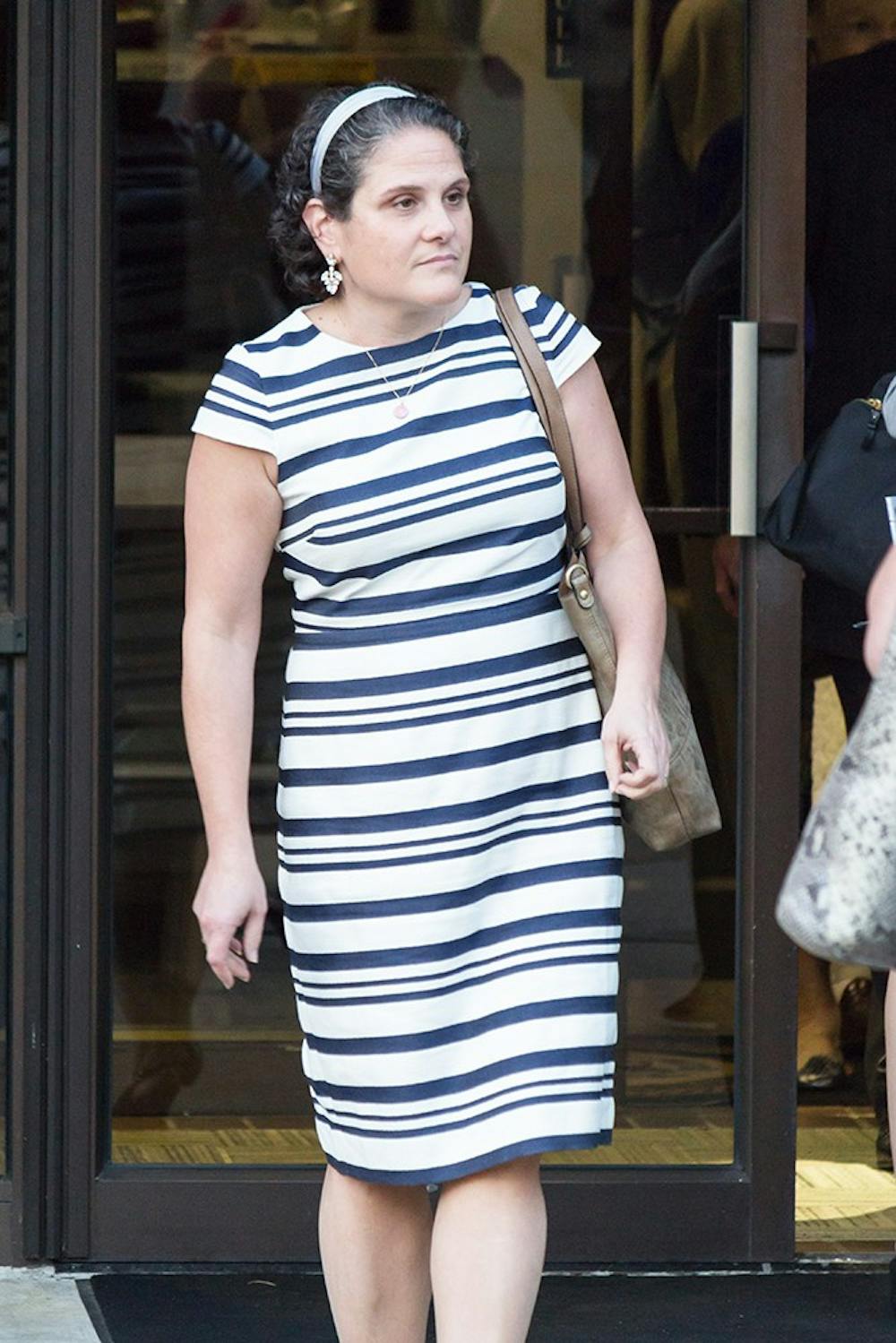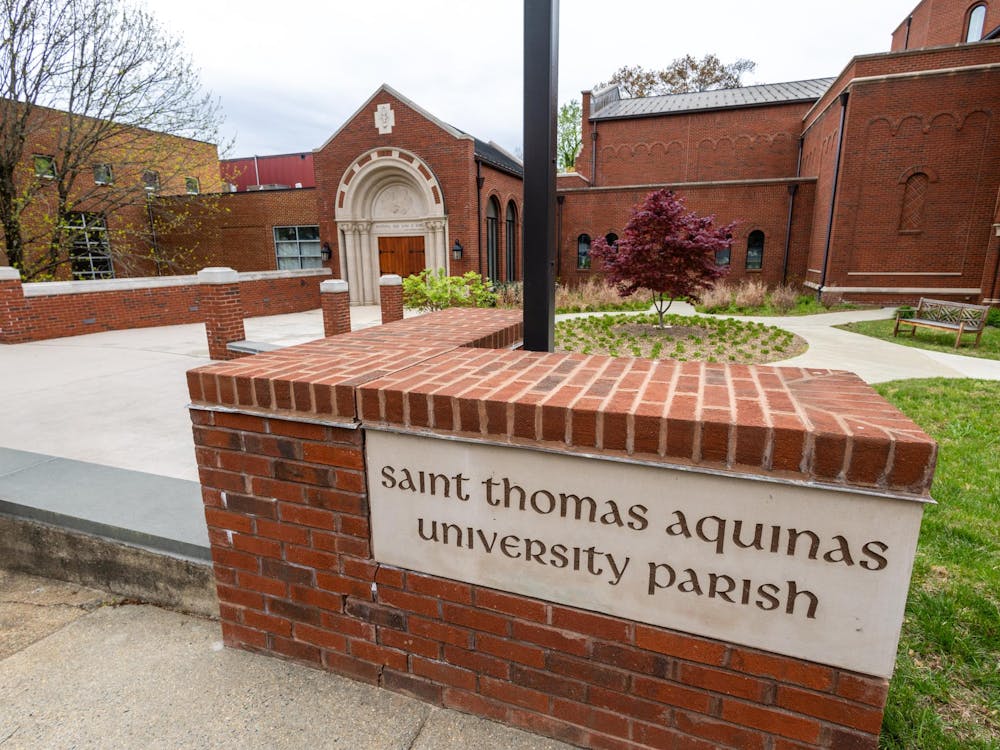The cross-examination of former University Associate Dean Nicole Eramo continued Wednesday, as part of her $7.85 million defamation lawsuit against Rolling Stone magazine, Sabrina Rubin Erdely and Wenner Media, Inc.
Eramo started her testimony Tuesday afternoon. She claims Rolling Stone’s 2014 article, “A Rape On Campus” — which detailed an alleged gang rape at the Phi Kappa Psi fraternity house in 2012 — falsely presented her as uncaring and indifferent towards victims of sexual assault.
The article centered on a student named Jackie, whose claims of an alleged gang rape were later found to be unsubstantiated by a Charlottesville Police Investigation. Rolling Stone retracted the article in April 2014.
Eramo finishes testifying
Elizabeth McNamara, an attorney defending Rolling Stone and Erdely, moved her line of questioning from the specifics of the sexual assault Jackie alleged had taken place, to examining the conduct of the University under its 2011 Title IX Policy.
McNamara asked Eramo why the University did not open an investigation into Jackie’s allegations.
Eramo said she felt it would be best to get Jackie back in front of the police, as they would be more effective in getting information in cases this old. Jackie first met with police in April 2014, but her alleged gang rape occurred in September 2012.
Eramo said the University was “taking steps to do the most effective investigation possible.”
The defense also introduced a September 2014 WUVA interview with Eramo.
The defense introduced full footage of the interview, which showed Eramo answering questions about how the University sanctions sexual assault. McNamara said unlike the Honor Code, there is no single sanction for sexual assault, and there is an average punishment of a one- to two-year suspension for those found guilty.
McNamara suggested if a student can get expelled for cheating but not sexual assault, then some people may think the University doesn’t take sexual assault seriously.
“They could think that. I believe our other actions suggest we make it important,” Eramo said. “Suspension is noted on their transcripts forever and there are requirements to come back.”
The attorney went on to question which statements in the article Eramo was contesting.
Eramo challenged the quote from the article that, “Lots of people have discouraged [Jackie] from sharing her story” and said she felt this referred to her personally. She also challenged the quote Jackie allegedly provided from Eramo — “Because nobody wants to send their daughter to the rape school.”
Eramo also responded to an editor’s note that was added to the article in December 2014, which apologized to those affected by the article.
“By this point I had been told Rolling Stone stands by its statement in regard to me,” Eramo said. “I don’t believe it’s a sincere apology.”
Following McNamara’s cross-examination, Eramo’s attorney Tom Clare asked Eramo how she felt about her portrayal in the article.
“I was portrayed as someone who would manipulate young women to not report rapes,” Eramo said.
Eramo also read aloud from a letter she had written to Rolling Stone after the article was published.
“Perhaps more egregious and shocking were the threats that I received expressing hope that I be killed or raped,” Eramo read.
Even at the trial, Eramo was yelled at when she went outside for a lunch break. The heckler recognized her and called her a “rape apologist.” In addition, Eramo said in court she has also received threats aimed at her daughter.
Kathryn Brenner, corporate communications director at Wenner Media, provided a statement to The Cavalier Daily following Eramo’s testimony.
"A multi-year review of sexual violence at U.Va. by the U.S. Department of Education found Dean Eramo to have specifically contributed to the University's hostile environment for sexual assault victims — an assertion much more critical of Eramo than any statement from the article,” the statement said.
Emily Renda’s video deposition played for the jury
Following Eramo’s cross examination, Emily Renda’s video deposition was played for the jury. Renda was a fourth-year student when the Rolling Stone article was written and worked with two sexual assault groups on Grounds during her time at the University — One Less and One in Four.
“It was my understanding from our first conversation that … [Erdely] wanted to write about what she called ‘rape culture’ broadly,” Renda said.
Renda also said Rolling Stone left out “odd key details,” and made the University look like a dark place where rape culture reigned supreme, and the people working to undermine that were portrayed as members of that culture.
Renda cried in her video deposition as she spoke about the aftermath of the article, and the pain she said it had caused Eramo.
“The thing [Eramo] was very passionate at doing, being there for them — that mischaracterization of her made it impossible to continue doing what she loved doing,” Renda said.
Renda said at the time Eramo thought one of the reasons the University chose not to terminate her employment was because if she was still employed, she wouldn’t be able to talk to the media.
She also said Eramo was very concerned about Jackie’s well-being.
“I know that she cried all day on Nov. 19,” Renda said. “She hid in her office. She felt very sick. She was very sick.”
Watching everything unfold was very distressing, and a lot of the work she had done to increase collaboration and encourage reporting had been undermined by the article, Renda said.
“I felt that it was kind of all for nothing,” Renda said. “I want nothing to do with this issue anymore.”
After a period of time, Renda said there was a point at which she became confused as to whether Jackie’s story as it was portrayed in the article was legitimate.
“I began to feel inklings of doubt … but chalked those up to differences in storytelling and trauma,” Renda said. “[Jackie] complained that no one believed her anymore, and I told her that I still believed her … people were still there for her.”
Erdely is called to the stand
Erdely — who began writing for Rolling Stone in 2008 — said in her testimony she considers herself to be an experienced journalist, and then underwent questioning by the prosecution for roughly an hour.
When Erdely was a college sophomore, she won a journalism award from Rolling Stone for an article about Michelle Shocked, in which she plagiarized and misattributed sources. She later gave an interview to her alma mater in which she explained her major mistakes on camera.
Eramo’s attorneys said they wanted to use the interview because it was an instance of similar conduct, while Erdely’s lawyers argued it was irrelevant because it happened 20 years ago.
“Rolling Stone knew the kind of journalism they were getting,” Eramo’s attorney Libby Locke said.
The judge ruled to hold off on bringing up the tape until Thursday.
“I report out the facts as thoroughly as I can,” Erdely said.
The prosecution examined several articles which Erdely had written previously for Rolling Stone on the topic of sexual assault. Erdely defended every article she had written, saying she was most interested in exploring why these things were happening and finding the cracks in the system.
“I was performing a public service,” Erdely said. “I was pointing out that there are flaws in the system.”
Locke referred to emails Erdely had sent to potential sources for “A Rape on Campus.” In each one, Locke pointed out that Erdely wrote that she wanted to have her article exploit institutional indifference.
Erdely said she took issue with Locke characterizing her articles as being about institutional indifference towards sexual assault, as she did not think institutional indifference meant the same thing to Locke as it did to her.
Court will continue Thursday morning with Erdely on the stand.







